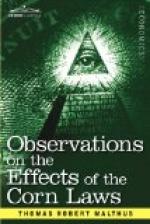Dr Smith was evidently led into this train of argument, from his habit of considering labour as the standard measure of value, and corn as the measure of labour. But, that corn is a very inaccurate measure of labour, the history of our own country will amply demonstrate; where labour, compared with corn, will be found to have experienced very great and striking variations, not only from year to year, but from century to century; and for ten, twenty, and thirty years together;(1*) and that neither labour nor any other commodity can be an accurate measure of real value in exchange, is now considered as one of the most incontrovertible doctrines of political economy, and indeed follows, as a necessary consequence, from the very definition of value in exchange. But to allow that corn regulates the prices of all commodities, is at once to erect it into a standard measure of real value in exchange; and we must either deny the truth of Dr Smith’s argument, or acknowledge, that what seems to be quite impossible is found to exist; and that a given quantity of corn, notwithstanding the fluctuations to which its supply and demand must be subject, and the fluctuations to which the supply and demand of all the other commodities with which it is compared must also be subject, will, on the average of a few years, at all times and in all countries, purchase the same quantity of labour and of the necessaries and conveniences of life.
There are two obvious truths in political economy, which have not infrequently been the sources of error.
It is undoubtedly true, that corn might be just as successfully cultivated, and as much capital might be laid out upon the land, at the price of twenty shillings a quarter, as at the price of one hundred shillings, provided that every commodity, both at home and abroad, were precisely proportioned to the reduced scale. In the same manner as it is strictly true, that the industry and capital of a nation would be exactly the same (with the slight exception at least of plate), if, in every exchange, both at home or abroad, one shilling only were used, where five are used now.
But to infer, from these truths, that any natural or artificial causes, which should raise or lower the values of corn or silver, might be considered as matters of indifference, would be an error of the most serious magnitude. Practically, no material change can take place in the value of either, without producing both lasting and temporary effects, which have a most powerful influence on the distribution of property, and on the demand and supply of particular commodities. The discovery of the mines of America, during the time that it raised the price of corn between three and four times, did not nearly so much as double the price of labour; and, while it permanently diminished the power of all fixed incomes, it gave a prodigious increase of power to all landlords and capitalists. In a similar manner, the fall in the price of corn,




